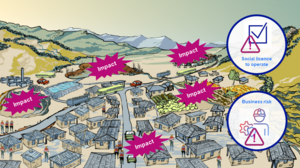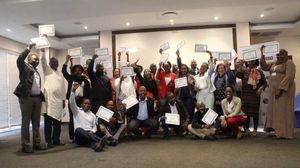Health Impact Assessment Teaching & Training
We offer a wide spectrum of HIA teaching and training courses:
- Graduate and post-graduate level courses and on-the-job trainings
- The whole spectrum form short lectures and short courses to modular, comprehensive and multi-day trainings
- In-person and remote trainings with a high level of interactivity and case study examples
- Tailor-made trainings for diverse needs and audiences, including government agencies, development agencies, funding agencies, industry associations, private sector, academic institutions
- HIA teaching and training in German, English, French and Portuguese

Mirko Winkler
Associate Professor, PhD, DTM&H, MSc
Head of Unit
+41612848339
,
*
mirko.winkler@swisstph.ch

Astrid Knoblauch
Dr.
Technical Expert
+41612848675
astrid.knoblauch@swisstph.ch
Selected Projects
HIA Training for Anglo American staff

Swiss TPH developed and delivered on-the-job training to Anglo American employees worldwide on the HIA approach to community health and safety management for the company's operations. This interactive training programme aimed to create awareness and a basic understanding of community health risks and impacts and how to manage them. This tailor-made, comprehensive 3-hour online training included short theoretical inputs, quizzes, question and answer sessions and case study videos. Read more
University course on HIA Concepts and Case Studies

This graduate course, offered annually at the Federal Institute of Technology Zurich (ETH) and the University of Basel, equips students with the tools and methods to systematically evaluate the health effects of policies, programmes and projects. Using global case studies from the private (e.g. extractive industries, water resources) and public sectors (e.g. air pollution, wastewater management), students explore key HIA concepts and methodologies. Students critically assess the HIA process - from screening to monitoring - and apply tailored tools in diverse social, ecological and epidemiological case study settings. Read more
Short courses on HIA of large infrastructure projects

This 3-5 day, face-to-face, interactive, case-study based course on HIA is designed for private sector professionals, public health professionals and representatives from various ministries (including health, environment and mining) and is regularly conducted. Aimed at strengthening the use of HIA in the approval process of large infrastructure projects, the course provides participants with a solid understanding of the approach. Through theoretical input, case study exercises and practical discussions, participants will explore key HIA concepts, its role in the systematic management of community health and safety, and its application in project-affected communities. The course covers key topics such as engaging with vulnerable groups, communicating HIA findings and developing career opportunities in HIA, ensuring a comprehensive and practical learning experience. This training format has been implemented in Brazil, Burkina Faso, Ghana, Mozambique, Republic of Congo, Tanzania, Uganda and Vietnam. Read more
Training on World Bank’s ESS4

This interactive online learning experience is designed for World Bank social risk specialists and World Bank clients to address the unique challenges of operationalising the Environmental and Social Standard on Community Health and Safety (ESS4) within the Environmental and Social Framework. Divided into five modules - each comprising 1.5 hours of individual work and 1.5 hours of online sessions for a total of 15 hours - the course uses e-learning videos, individual exercises, case studies, group learning experiences, and resource materials. Participants will learn the concept of HIA as an effective approach to operationalising ESS4, with a particular focus on avoiding and minimising adverse health impacts and promoting health opportunities.
Selected Publications
Himmelsbach G.S, Zabré H.R, Leuenberger A, Knoblauch A.M, Brugger F, Winkler M.S. Exploring the impact of mining on community health and health service delivery: perceptions of key informants involved in gold mining communities in Burkina Faso. Int J Environ Res Public Health. 2023;20(24):7167. DOI: 10.3390/ijerph20247167
Luyten A, Winkler M.S, Ammann P, Dietler D. Health impact studies of climate change adaptation and mitigation measures: a scoping review. J Clim Chang Health. 2023;9:100186. DOI: 10.1016/j.joclim.2022.100186
Cossa H, Dietler D, Macete E, Munguambe K, Winkler M.S, Fink G. Assessing the effects of mining projects on child health in sub-Saharan Africa: a multi-country analysis. Global Health. 2022;18:7. DOI: 10.1186/s12992-022-00797-6
Dietler D, Farnham A, Lyatuu I, Fink G, Winkler M.S. Industrial mining and HIV risk: evidence from 39 mine openings across 16 countries in sub-Saharan Africa. AIDS. 2022;36(11):1573-1581. Video Abstract: http://links.lww.com/QAD/C557. DOI: 10.1097/QAD.0000000000003294
Knoblauch A et al. Community health impacts of the trident copper mine project in Northwestern Zambia: results from repeated cross-sectional surveys. Int J Environ Res Public Health. 2020;17(10):3633. DOI: 10.3390/ijerph17103633
Winkler M.S et al. Health impact assessment international best practice principles. 4. Fargo, USA: International Association for Impact Assessment, 2021. Read publication